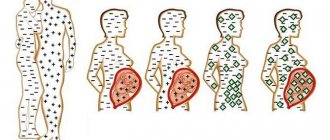Conception, pregnancy and childbirth are important processes that give life to a new person. If a married couple is thinking about having a child, then it is necessary to carefully prepare your body for this process. In consultation with a doctor, he is guaranteed to recommend vitamins for women when planning pregnancy. Thanks to this, her body will be able to prepare and gain strength for a complex process.
…
To drink or not to drink?
Among doctors and their patients, there are two opposing opinions about whether vitamins are needed before planning pregnancy and during it.
Some doctors believe that they are not only unnecessary, but can even be harmful. For example, candidate of medical sciences Alexander Melnikov claims that good nutrition fully provides the body with everything it needs. If you take vitamins when planning a pregnancy and during pregnancy, this can be fraught with allergies and bronchial asthma in the child.
Dr. Alexey Yakovlev (former chairman of the National Society of Industrial Medicine) argues that drugs should be taken strictly according to indications, in case of deficiency of a specific vitamin, in case of certain symptoms in a woman. If you do not suffer from any disease, then drinking them “just in case” for prevention is harmful, says the doctor. The universal prescription of “vitamins” only benefits the pharmaceutical industry. Because it is a profitable business.
Naturopath Evgenia Kitorskaya writes that complexes are prescribed to all pregnant women in a row, without trying to find out whether a particular woman has a deficiency. And they feed the woman “synthetics,” which in itself is not healthy. At the same time, pharmacy vitamins are poorly absorbed compared to natural ones.
Most doctors believe that modern people do not receive enough nutrients from food. First, we require less food than our ancestors. After all, our energy consumption is minimized due to sedentary work and transport. Secondly, modern foods, stuffed with chemicals, are not nearly as nutritious as they were 100-200 years ago. But we need as many vitamins as a caveman or, for example, a medieval peasant. And in preparation for pregnancy, the need for nutrients increases. Therefore, you cannot do without synthetic “vitamins”.
By the way, the validity of this opinion is indirectly confirmed by statistics. In the 90s in Russia, when the country lacked food and pharmaceutical vitamins, the number of children born with developmental defects increased.
“Today’s research confirms a significant deficiency of vitamins in our diet and, accordingly, in our bodies,” confirms obstetrician-gynecologist, doctor of the highest category, candidate of medical sciences, director of the Repromed family clinic Elena Kanaeva. — For pregnancy planning, a specialized complex containing folic acid and a balanced composition of regular vitamins and microelements is recommended. Manufacturers can be Russian or foreign; the pharmacist will suggest specialized vitamins for this case. If there are problems with conception, vitamins alone will not be enough; your doctor will prescribe additional corrections.
TOP best vitamins for women
With all the variety of complexes, doctors highlight the best vitamins for pregnancy planning, such as:
- Folic acid is the most affordable drug and the most effective in the fight against toxicosis and iron deficiency anemia.
- Femibion is a complex containing 9 vitamins and iodine. It is indicated for use by both women who are just planning a pregnancy and those who are pregnant for up to 12 weeks. 1 tablet contains the daily dosage of vitamins B, C, E and iodine.
- Vitrum Prenatal - contains 10 vitamins and 3 minerals (vitamins B, A, D3, C, E, nicotinamide, folic acid, calcium carbonate, iron, zinc).
- Elevit Pronatal (Elevit) - its composition includes vitamins A, E, D, C, B1, B6, B12, zinc, copper, iron, calcium, magnesium, phosphorus and other substances. Taking the complex is recommended for those planning to conceive, pregnant and lactating women.
Do I need them?
But whether or not to drink vitamins to prepare for pregnancy is up to you personally to decide together with your doctor. Perhaps you should limit yourself to strict adherence to healthy eating rules. They do not threaten any consequences if the mother is not allergic to a certain product. For example, smoothies made from fruits or vegetables are a good alternative. They contain many vitamins necessary for pregnancy. You can make these healthy treats yourself using a mixer.
By the way, even opponents of pharmaceutical vitamin preparations usually recommend taking folic acid when planning and in the first trimester of pregnancy. You definitely shouldn’t give up this important drug.
Folic acid and vitamin E
The main microelement taken when planning and bearing a child is folic acid. It is especially important to take it during 3–4 weeks of pregnancy. The component promotes proper cell division, transfer of gene energy and forms placental cells.
At this time, the fetal neural tube is formed. Folic acid deficiency can lead to fetal failure or miscarriage. Lack of acid also affects the development of physical abnormalities such as cleft palate, cleft lip, hydrocephalus, and underdevelopment of the brain.
Among foods that contain folic acid, nutritionists call chicken liver, legumes, wholemeal bread, and spinach. The daily norm for a pregnant woman is 0.4–0.8 mg.
Why do you need vitamin E during pregnancy? It strengthens placental cells, normalizes metabolic processes, and promotes the production of the optimal amount of sex hormones. In plant form, tocopherol is found in all vegetable oils, greens, peas and rose hips.
How much vitamin E should you take during pregnancy? Typically, the norm of this vitamin for pregnant women is 2-3 capsules per day. But it is still better to agree on the exact dosage with your doctor, who will take into account the characteristics of your body and nutrition.
If you drink, what kind?
Usually, even before pregnancy, the doctor tells you which vitamins to choose for women when planning pregnancy. It is generally accepted that the right complex when planning pregnancy helps to successfully get pregnant, contributes to the formation of good immunity in the baby and reduces the risk of diseases. Useful microelements provide nutrition to tissues and organs.
The pharmaceutical market is overcrowded, most people are confused and cannot choose which vitamins to take when planning pregnancy for men and women. When planning to create a new life, every mother must ask the doctor which complexes are best to take, why they are useful and why they can be dangerous. Even in order to successfully get pregnant, the doctor advises girls to take special vitamins for pregnancy planning. Often expectant mothers prescribe them for themselves. But taking medications incorrectly can prevent the fetus from developing normally. They should only be taken with a doctor's prescription! When using them, you should be aware of contraindications and possible allergic reactions.
Necessity of admission
Doctors recommend starting the preparatory process 6 months in
before planned conception. During this period, all the necessary elements will be able to accumulate in the body. Otherwise, after fertilization, the embryo will take them away from the mother. It is in this case that the risk of developing serious pathological situations increases. Vitamins for conceiving a child for women are taken in order to preserve the beauty and good health that she originally had.
Important!
Not only the woman should take special medications; the man also takes part in the process of conception.
The sperm must also be strong.
Only in this case will you be able to quickly conceive a healthy baby. A complex of vitamins when planning pregnancy is prescribed only after a detailed examination
both patients. To do this, you will first need to take a blood test.
Based on its results, a specific medication will be prescribed, which is necessary for future conception.
are very popular among expectant mothers .
The composition includes all the components that are necessary to normalize the functioning of the immune system.
Additionally, the likelihood of conception in a short time increases. Some doctors prescribe their use during pregnancy and breastfeeding. High quality is confirmed by a large number of clinical trials. They are completely safe, so they will not harm the baby’s or mother’s body.
When planning pregnancy, it is advisable to prescribe a complex of vitamins in the following situations:
- In winter or summer, which is very hot.
- A woman is forced to live under conditions of great physical or mental stress.
- Stress.
- Vitamin deficiency due to improper or poor nutrition.
List
When preparing for pregnancy, a woman needs vitamins. They promote proper conception, good embryo development and a calm birth. A woman’s reproductive system negatively “responds” to hypovitaminosis.
Throughout pregnancy, a woman must supply the child with valuable substances for the formation of vital organs and a strong psyche of the future person. And when planning a pregnancy, the participation of men in all vitamin “procedures” is mandatory. Here is a list of vitamins that a couple needs to take if the girl is planning to give birth.
Vitamin C
It ensures active synthesis of testosterone and other male hormones. Thanks to the vitamin, healthy sperm are formed, which increases the chances of getting pregnant in a short time. Ascorbic acid also strengthens the vascular wall, thereby reducing the possibility of rupture of veins and arteries. Some women are allergic to vitamin C, which can not only lead to unpleasant sensations and spots on the body, but also to the development of chronic allergies in the child. Take 100 mg per day.
Zinc
Supports stable sperm development and improved immune system. It also promotes the production of additional hormones, which leads to increased sexual desire. The disadvantages include too much synthesis of hormones, which can lead to defects in the development of the embryo. When planning pregnancy, take 100-150 mg per day for women and 200-250 mg for men.
Selenium
This trace element is mostly necessary for men. It increases libido and prolongs sexual activity. The drug has approximately the same effect on women, but to a much lesser extent. Take 50 mg.
Vitamin H
Ensures normal distribution of nutrients and oxygen throughout both the embryo and the mother’s body. Consume 300 IU per day.
Iodine
It should be taken not only at the stage of planning conception and pregnancy, but also during breastfeeding. Lack of iodine is bad for both mother and baby because the fetus will take most of the nutrients from the mother's body. Iodine contributes to the normal development of the fetal nervous system, and is also a natural antidepressant for the mother and promotes the proper functioning of the thyroid gland.
Vitamin B6
This element plays a key role in the development of the embryo. When planning pregnancy, the vitamin speeds up metabolism and improves the activity of the central nervous system. It helps not only to establish a healthy nervous system for the child, but also to improve the activity of the mother’s central nervous system. The only contraindications for use are vitamin intolerance and renal failure. It is recommended to use B6 six months before the expected conception, but you can limit yourself to a 40-day course. Take 2-3 mg per day.
Most of the necessary vitamins are found in ordinary foods.
Most often, doctors prescribe complexes for pregnant women for those planning a pregnancy. Professionals know exactly what vitamins you need to take and combine them into “sets.” They are absorbed faster and better.
Elevit
Different complexes have different compositions. For example, Elevit, unlike its “colleagues,” does not contain iodine and therefore is prescribed to those for whom iodine is contraindicated due to problems with the thyroid gland.
Vitrum
Vitrum contains almost all the same active substances for women as Elevit, plus iodine, so women do not have to take Iodomarin.
Alphabet
Also, when planning a pregnancy, you can drink the Russian Alphabet, which contains 11 minerals and 13 vitamins. To make the beneficial substances better absorbed, they are divided into three types of tablets - blue, pink and white. It is important not to forget about taking these vitamins in a timely manner. The advantage of the drug is its low price.
Femibion I
One of the most popular drugs is the Austrian Femibion I. It is intended specifically for those planning a pregnancy and for pregnant women in the first trimester, as it contains an increased amount of folic acid. Suitable for those planning and more affordable in price is the Russian Complivit Trimester 1, it also contains a lot of folic acid.
Vitamin complexes when planning pregnancy
It is difficult to get the necessary vitamins only from food and taking each vitamin separately is the wrong approach, since some vitamins can interfere with other vitamins. For example, excess vitamins A and E in a woman’s body will block the absorption of vitamin K, so these elements must be taken separately. Special vitamin kits developed for women, used when planning pregnancy, contain in one capsule/tablet the required amount of vitamins that are compatible with each other.
The body of the expectant mother must have the necessary supply of nutrients, otherwise conception may not occur, since the lack of a number of microelements impairs reproductive functions.
The most effective drugs for planning conception:
- "Centrum Materna" - used during the planning period of conception, prepares the body for the upcoming pregnancy and supports it after conception, affects the development of the embryo.
- “Complivit Mama” is a vitamin and mineral complex for planning pregnancy. It is recommended to take 2-3 months before pregnancy, which will ensure a supply of essential minerals in the body. Minerals strengthen hair and nails, relieve fatigue and drowsiness.
- “Alphabet Mom’s Health” – prepares a woman’s body for pregnancy, is responsible for hematopoiesis, improves the nervous and musculoskeletal system. The composition includes: iodine, folic acid, calcium and other elements. Take one tablet three times a day.
- "Aevit" - contains fat-soluble vitamins that ensure the production of important enzymes. The impressive content of vitamin E has a beneficial effect on the reproductive organs, and its deficiency causes hormonal surges in the body. It is also intended to provide a supply of substances necessary for the fetus to develop; it is useful for low libido, gynecological diseases and toxicosis. A lack of the substance leads to fetal death and premature miscarriages, as it preserves the functions of the placenta connecting the mother and the embryo. You need to take the drug 2-3 months before conception, 1 tablet twice a day.
- "Elevit" - supports the body, accumulating the necessary minerals for a planned pregnancy and bearing a baby, prevents congenital defects, and provides optimal nutrition to the embryo. It contains: iron, phosphorus, calcium, magnesium, zinc, copper. Take one tablet per day for a month.
- "Vitrum Prenatal Forte" - the complex is rich in vitamins, minerals, iodine and calcium. It is recommended to take it over a long period of time to prepare the body for conception. Provides growth and strengthening of hair and nails, gives a healthy tone to the skin, eliminates toxicosis.
- "Femibion" - promotes conception and prepares the body, saturating it with microelements, has a general strengthening effect and has a positive effect on the nervous system, is considered one of the best multivitamins when planning conception. "Femibion 1" is taken until the 12th week (first trimester), "Femibion 2" is taken in the second trimester from the 13th week. The composition includes: folic acid, elements of group B, E, C, PP, biotin, metafolin, Omega-3, iodine. The drug normalizes metabolism, hematopoiesis, functions of the cardiovascular system, central nervous system, and autonomic nervous system.
- “Pregnoton” – contains zinc, folic acid, fatty acids, vitamins E, B and C, biotin, selenium. Take one capsule daily with meals.
A deficiency of vitamins before planned conception can cause a risk of pathologies in the development of the embryo and the threat of premature termination of pregnancy. Taking beneficial microelements helps the proper division of embryonic cells, the formation of the placenta, the synthesis of hormones, the production of progesterone, conception, reducing the risk of miscarriages, and the prevention of the nervous system.
The table below shows the average cost and manufacturer of the drugs described above:
| Name | Manufacturer country | Price |
| "Centrum Materna" | Germany | 128 rub. |
| "Complivit Mama" | Russia | 230 rub. |
| "Alphabet Mom's Health" | Russia | 366 rub. |
| "Pregnavit" | Germany | 390 rub. |
| "Aevit" | Russia | 98 rub. |
| "Elevit" | Russia | 747 rub. |
| "Vitrum Prenatal Forte" | India | 629 rub. |
| "Femibion-1" | Germany | 490 rub. |
| "Pregnoton" | Russia | 700 rub. |
What vitamins can be dangerous?
Some vitamins are essential, but if overdosed, they can lead to various problems during pregnancy and even fetal malformations.
Vitamin A
Excess is fraught with heart disease and improper formation of the nervous system and skeleton. For women and men before conception, the norm is 5000 IU and no more. To avoid an overdose, avoid synthetic drugs (for example, be careful with Aevit). Better eat fish, carrots, liver.
Ascorbic acid
Ascorbic acid is necessary, but if overdosed, it can lead to early miscarriages. The daily dose is 100 mg.
Vitamins in the first, second and third trimesters of pregnancy
What vitamins to take at the beginning of pregnancy? During the first trimester, the baby's body is formed. The optimal vitamins for this period are folic acid, vitamins A, E, C. Among the microelements necessary for use at the beginning of pregnancy, doctors call calcium, potassium and zinc.
At 4–6 months of pregnancy, the necessary vitamins for the health of the mother and fetus are A and C. Doctors also believe that for this period it is important to take the trace elements of iodine and calcium.
In the third trimester of pregnancy, a woman should take vitamins A, C, D. Preparations containing iron, omega fat complex and plant fiber are used as microelements.
Safety rules: what to remember
The first thing every expectant mother needs to remember is that you cannot prescribe any medications for yourself. The selection and prescription of vitamins should only be carried out by a gynecologist who has familiarized himself with the tests and examinations of the pregnant woman.
If after taking the prescribed complexes you experience rashes, itching, or insomnia, you must stop taking them and consult your doctor. These symptoms indicate that either a dose adjustment of the complex is necessary, or an allergy to one of the components has manifested itself.
When the expectant mother suffers from kidney, liver and bladder diseases, taking all medications must be accompanied by medical supervision, in the form of regular tests. This will prevent vitamin deficiency and fetal development disorders.
Complexes, like medications, may have their own contraindications. An overdose of them can have dire consequences, so before taking medications recommended by friends or relatives, you should consult a specialist.
Vitamins before pregnancy
Is it advisable to take vitamins before pregnancy? Of course! All of them are, to one degree or another, responsible for the proper functioning of body systems and individual organs.
Vitamins for women
Ahead of the fair sex is a full forty weeks of intensive work of all body systems, as well as increased consumption of its energy, mineral and vitamin reserves. The lack of necessary important vitamins negatively affects the developing fetus, in severe situations even provoking developmental defects, and also induces a number of negative external manifestations in a woman - deterioration in skin quality, fatigue, hair loss/breaking hair/nails.
The optimal time to start taking vitamins for future representatives of the fair sex in an interesting position is six months before the date of conception of the child. The basic complex of important low molecular weight organic compounds includes the following elements:
- Folic acid. An essential element for increasing the likelihood of conception and significantly reducing the risk of defects in the fetus in the early period. The norm is 400 micrograms per day.
- Vitamin A. The norm is about 3 thousand IU per day.
- Vitamins B1, B2, B6 - in doses recommended by the doctor.
- Vitamin C. The norm is from 60 to 100 milligrams per day.
- Vitamin D - up to 400 IU/day.
- Vitamin E - up to 300 IU/day. One of the main factors in increasing fertility affects conception and the functioning of the reproductive system.
- Vitamin K - about one milligram per day.
- Vitamin H - up to 300 IU per day.
Vitamins for men
There is an opinion that only representatives of the fair sex need vitamins when planning pregnancy. This is not true, since 50 percent of successful conception comes from high-quality sperm. In order for your husband to produce high-quality genetic material, he needs to start taking vitamins at least three months before the start date of fertilization attempts.
Vision vitamin complexes – healthy vegetables and fruits in one package
The best vitamins for planning pregnancy have one name - Vision.
“Why Vision? “Aren’t there many other vitamins?” - some people ask. And everything is very simple, all “other” vitamins are synthetic vitamins, the benefits of which are in great doubt.
And on the side of vitamins from the international company Vision International People Group there are many advantages:
- All raw materials used in the production of vitamins for pregnant women and those planning pregnancy are exclusively natural and grown in environmentally friendly areas of the planet;
- The company's products are certified according to strict standards, one of which is the GMP standard, which regulates the quality of pharmaceuticals;
- The raw materials undergo special cryogenic treatment, during which all its beneficial and medicinal properties are preserved;
- The resulting product is completely safe for the health of future parents;
- Vitamins are absorbed by 98%, which exceeds the efficiency of vitamin absorption from food;
- The product has a number of guidelines for use, which were developed by specialists from the Moscow Academy of Medical Sciences. DI. Sechenov;
- The prices for Vision vitamins are affordable and allow you to purchase them regularly.
Vision is the most effective vitamins with microelements for women when planning pregnancy: within 24 months, if you follow your doctor’s recommendations, a long-awaited pregnancy can occur. It is recommended to take these vitamins along with the course prescribed by your doctor and be sure to pay attention to your health, proper nutrition and psycho-emotional state.
Question answer
Please advise which vitamins are best to take when planning pregnancy?
It is mandatory to start taking folic acid and vitamin E six months before the planned conception - they will ensure basic normalization of the sexual functions of the spouses, a quick and effective start of pregnancy, and protection of the embryo in the early stages. In addition, it is recommended to take multivitamin preparations, including groups of vitamins A, B1, B2, B5, B6, B12, C, D3, E, H, K, as well as various trace elements, from zinc and selenium to iron, manganese and iodine.
How to take vitamins when planning pregnancy?
You should take vitamins daily, following the recommendations of your doctor. Typically, a specialist prescribes a six-month course of taking multivitamins and individual substances not included in the multivitamin complex. The standard dosage regimen is 1-2 tablets 1-2 times a day (morning and evening after meals). In addition, it is recommended to separate the intake of vitamins and microelements in order to exclude the possibility of a mutual decrease in their effectiveness. Typically, manufacturers produce packaging in which the two groups of substances are separated into different blisters, and the tablets themselves differ in color. Read the instructions for information about the regimen for taking such medications.
Should I take vitamins before pregnancy?
Vitamins are responsible for a number of vital functions - during the period of conception and fetal development, the need for them only increases. With a lack of these low-molecular organic compounds, sexual dysfunction may occur, the likelihood of successful fertilization is significantly reduced and the risks of abnormal fetal development, including miscarriage, increase.
How and how much to take vitamin E?
Vitamin E is a unique low-molecular organic compound first discovered in the first half of the twentieth century. Its basic functions are immunomodulation and promotion of reproduction; in addition, it acts as a good antioxidant.
Most often, vitamin E is synthesized artificially in the simple compound tocopherol. In fact, a universal protector of all cell membranes, it acts as a reliable protector of all germ cells that may be subject to oxidation processes. For a woman who is planning a pregnancy, vitamin E along with folic acid becomes simply necessary, due to the active support of the synthesis of female and male hormones, as well as the embryo in the stage of formation of placental structures, which in turn significantly reduces the risk of miscarriage and abnormal development of the fetus further.
Almost all specialized multivitamin complexes contain this organic compound, although in insufficient quantities, because it requires at least 250 IU per day. If your multivitamins contain a lower concentration of this substance, you will have to additionally purchase it as a vitamin supplement. The usual dosage regimen is one 150 IU tablet twice a day, morning and evening after meals. The course is designed for six months, its completion should coincide with 12–20 weeks of pregnancy or before the expected date of conception.
Of the products, the most vitamin E contains wheat germ oil and its soybean analogue. In small quantities, it is also present in beef liver, whole grain bread, beans, broccoli, walnuts/hazelnuts.
How many vitamins do you need?
There is a vitamin intake rate that is not recommended to be exceeded:
- Vitamin A (retinol) - norm 0.9 mg, TDL* 3 mg;
- Vitamin B9 (folic acid) - norm 400 mcg, TDL 600 mcg;
- Vitamin B6 - norm 2 mg, TDL 6 mg;
- Vitamin C (ascorbic acid) - norm 90 mg, TDL 900 mg;
- Vitamin D - norm 10 mcg (400 IU), TDL 15 mcg (600 IU);
- Vitamin E (tocopherol) - norm 15 mg, TDL 150 mg;
- Magnesium - norm 400 mg, TDL 800 mg;
- Zinc - norm 15 mg, TDL 25 mg;
* VDU - upper permissible level of consumption, source: “technical regulations of the Customs Union “On the safety of food products” (TR CU 021/2011)”











